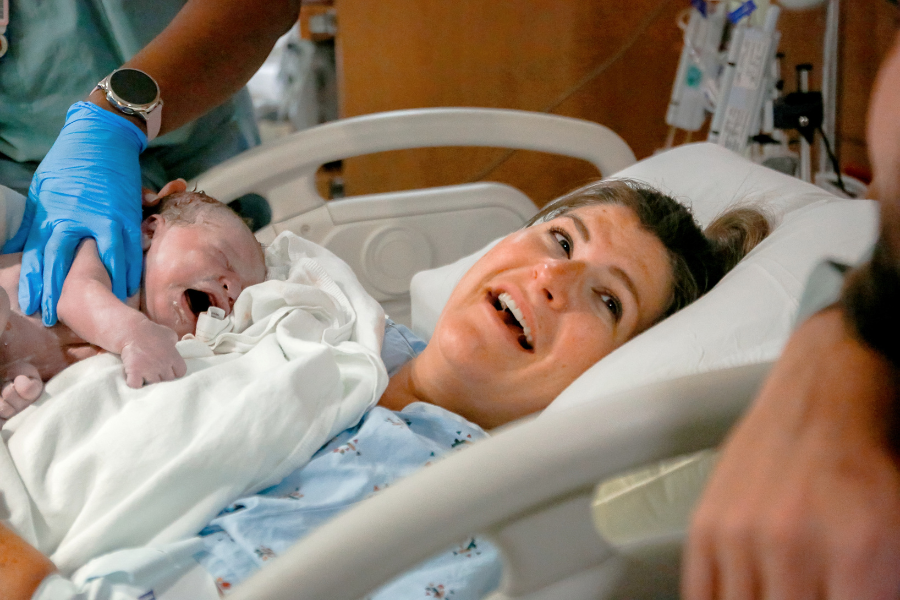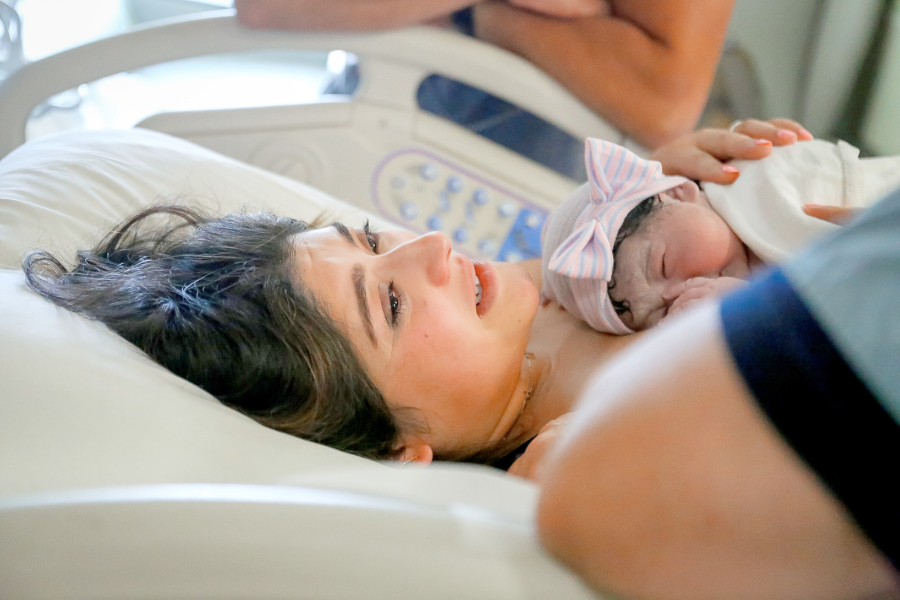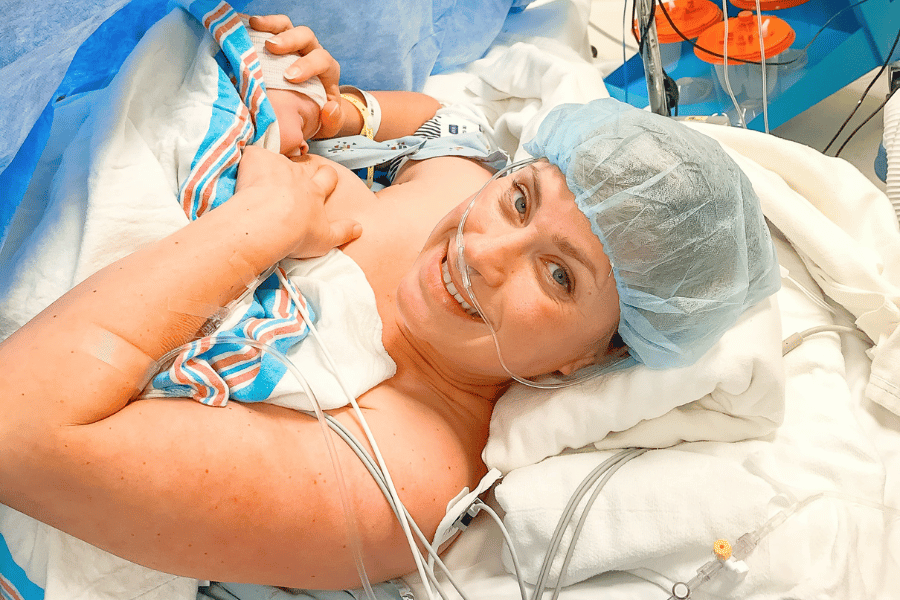Hi Mama! Are you currently trying to conceive, or maybe have a sneaking suspicion you might be pregnant? Knowing what some of the early signs of pregnancy are can help you determine if what you’re feeling actually could be pregnancy.
And believe me. Some of the weird pregnancy symptoms on this list might actually take you by surprise!
While it’s true that the BEST way to confirm your pregnancy is with a positive pregnancy test taken the day after your expected period, early pregnancy symptoms can definitely provide a clue!
And even if you have tested positive, learning what might be in store (and what you can do about it) can really help!
So let’s get to it! Early signs of pregnancy and weird pregnancy symptoms unpacked for you!
Follow @mommy.labornurse on Instagram to join our community of over 650k for education, tips, and solidarity on all things pregnancy, birth, and postpartum!
11 Early Signs of Pregnancy
1. Sore and swollen breasts
Shortly after conception, many mamas experience tender, sore, swollen breasts. Often, they are described as feeling very heavy, and they may be so sore that simply brushing against them or laying on your stomach causes serious discomfort!
This can indeed be a very early sign of pregnancy – mamas report this symptom just 1-2 weeks after conception. The thing is, sometimes it’s hard to spot. Yes, it can be quite dramatic, but lots of us experience sore breasts right before our periods, too. A lot of second time moms can pick this out as an early pregnancy symptom, but for first time moms it’s not always as apparent.
So why does this happen? The American Pregnancy Association explains that it’s the hormones in your body at work to get you ready to make milk. YES, it starts this early – pretty crazy, right?
How to get relief from sore breasts during pregnancy?
This is a symptom that can carry through your whole pregnancy, unlike some of the others on this list. For that reason, I highly recommend investing in some good, supportive bras! One hack I like to tell mamas is to go ahead and get some nursing bras now – yes, this early in pregnancy.
If you have even an inkling that you’d like to breastfeed, it makes sense to just buy these now, rather than buying bigger/comfier bras for pregnancy and then ALSO buying bras for nursing/postpartum.
The awesome thing about nursing bras is that most of them are very supportive without being restrictive or using underwire. This makes them perfect for sore and swollen pregnancy boobs. Kindred Bravely and Larken are my two go-to brands for maternity/nursing bras.
2. Elevated basal body temperature
If you’ve been actively trying to conceive, you may be tracking your basal body temperature. For those of you that aren’t familiar with temp charting, it’s where you take your temperature every morning before you get out of bed.
When ovulation occurs there is a detectable rise in your basal body temperature. If you successfully conceive, you basal body temperature may actually stay slightly elevated instead of dipping back down to your normal range.
This is really cool, and actually is one of the most reliable ways to detect pregnancy before a missed period!
Keep in mind, if you want to use this method, it’s important to learn the right way to track your temperatures and ensure you are doing it at the same time every day. But this is an added benefit too temping for a lot of mamas.
3. Bloating, constipation and a little extra gassy
So a lot of first trimester mamas suffer from uncomfortable bloating and constipation. In fact, what many of us think is a little baby bump is actually just bloating from all the progesterone pumping through our bodies.
In both of my pregnancies bloating and cramping were my first pregnancy symptoms! With Ryland (my second baby) bloating was for sure the first symptom I remember. I think I was partially more in tune with it because I’d been pregnant before, but I knew I was pregnant when the bloat set in almost immediately!
Why does this happen?
You see, bloating and constipation is caused by an increase in the hormone progesterone. This hormone is responsible for relaxing the muscles in your body (allowing for growth and expansion), but at the same time relaxes your intestinal muscles, which slows down digestion.
Progesterone spikes most significantly in the first trimester, which is why the majority of issues with constipation and bloating occurs then. This is an early sign of pregnancy that can occur shortly after conception, often peaking between weeks 8 and 12.
Your prenatal could be to blame!
One other common culprit of pregnancy constipation is your prenatal vitamin! If it contains iron, it may be contributing to your discomfort. Talk to your provider about switching to a prenatal without iron if anemia isn’t a concern for you.
How to relieve pregnancy bloating and constipation
I actually have a whole article dedicated to pregnancy constipation remedies with more tips, but here’s a quick list of ideas to get you going:
- Increase your water intake – there are so many benefits to staying hydrated during pregnancy, and this is definitely a big one
- Try to get yourself moving – yoga poses meant to relieve gas and constipation are great, and even a short walk can help get things going
- Drink warm liquids – herbal tea can be surprisingly effective at moving things along
- Add a probiotic to your daily regimen – I use Mary Ruth’s Liquid Probiotic (this can help manage heartburn if and when it creeps up, too!)
A note on the gassiness specifically
I kind of lumped these symptoms together because they’re all related to slowed down digestion thanks to that surging progesterone. But girl, the extra burping and flatulence is real, hah!
4. Nausea aka Morning Sickness
Perhaps the most iconic early pregnancy symptom, yep, morning sickness. Or as so many prefer to call it, all day sickness. When you look at the research, nausea occurs in an estimated 50-80% of pregnant women. And there seems to be a link to worse nausea in women with high stress, extreme exhaustion, pregnancy with multiples, and when blood sugar drops.
The crazy thing is, experts still don’t know exactly why morning sickness happens. Of course we can all guess it has to do with surging hormones (especially the pregnancy hormone, hCG). This guess is rooted in the fact that hCG level rise throughout the first trimester and then level off sometime in weeks 14 to 20. For many, this coincides with the peak and then disappearance of pregnancy nausea.
When does morning sickness start?
As far as it being an early sign of pregnancy? Most sources say that morning sickness starts in week 6 of pregnancy. At this point, you’re likely to have already had a missed period and positive pregnancy test. But there is definitely anecdotal evidence of women who feel pregnancy nausea very soon after conception.
HCG does start to increase in the body right away, so if this hormone is to blame for nausea during pregnancy it’s certainly possible to be feeling yucky sooner than 6 weeks. According to The Cleveland Clinic, about 70% of pregnant women get morning sickness with about 3% of those cases being severe nausea and vomiting.
It’s generally accepted that morning sickness peaks between weeks 9 and 11. Again this lines up with average hCG levels – which typically stop rising sometime between weeks 8 and 11 (source).
When does morning sickness end?
Most sources and information say that morning sickness ends with the first trimester, but the truth is that may not be your reality. When you dig into the research, it often lasts a bit longer.
This study in the American Journal of Obstetrics and Gynecology found that around 50% of women had nausea relief at the end of the first trimester (week 14) but by week 22 over 90% finally had relief.
What to do about pregnancy nausea?

You can find a wealth of information over in my article, First Trimester Tips, but here’s a quick rundown to help you find relief ASAP. Because girl, I know it sucks!
- Acupressure bands are worth a try
- Anything ginger can really help – tea, candies, cold drinks
- Small servings of protein
- Sniff an alcohol swab if you think you’re about to vomit (this is a tried and true nurse trick!)
- Essential oil smelling blends are great too
- Ooo and try to take your prenatal at night!
Think what’s going on is MORE than normal pregnancy nausea? Learn more about Hyperemesis Gravidarum.
5. Heightened sense of smell
Yes! So many mamas say that this is BIG clue that they are pregnant. And it’s funny because even as a labor and delivery nurse I didn’t know it was a thing until I experienced it myself.
But yeah, many women have a shift in their sense of smell that makes everything smell stronger and may even cause cravings, aversions, and nausea.
So if you’ve suddenly got a spidey-like sense of smell it just might be an early sign of pregnancy. As far as what to do about it? This can actually be a pretty annoying little pregnancy symptom, but it will probably stay with you until you deliver.
Carrying around alcohol pads or essential oil smelling sticks is the one little trick that seems to help if you’re experiencing a particularly bad smell and it’s causing nausea.
6. Cravings and aversions
And on that note, craving and aversions are another early sign of pregnancy for a lot of mamas! This is a symptom that often goes along with a change in your sense of smell and general nausea.
Chances are you’re going to have a pretty strong opinion of what you can and cannot eat in the first 12 weeks. Cravings and aversions often subside a bit in the second trimester (at least the strong aversions do anyway).
The most common pregnancy food aversions are meat, eggs, onions, garlic, spicy foods, and generally strong-flavored dishes and meals. Cravings can run the gamut but commonly mamas crave bland foods like toast, cereal, and oatmeal, comfort meals like mac and cheese and chicken nuggets, or have a strong preference for generally sweet or salty snacks.
I TOTALLY craved sushi and Chick Fil A while I was pregnant, hah!

7. Feeling like you always have to pee
It’s true! The frequent need to urinate often begins in the first trimester. Later in pregnancy, your growing baby and expanding uterus put pressure on your bladder, making you feel like you need to pee more often.
But early in pregnancy, frequent urination is due to your increased blood volume. When you are pregnant, your blood and bodily fluids increase, meaning more processing for your kidneys. This extra work means extra trips to the bathroom for you.
This is definitely an early pregnancy symptom, but usually happens after a positive pregnancy test. Most women notice this starting between weeks 8 and 10.
8. Exhaustion and fatigue
First-trimester exhaustion is real y’all. And it makes sense! Growing a baby takes a lot of energy. During the first trimester, your body is growing an entire placenta along with many of baby’s major organ systems. It is totally normal to feel very fatigued during the first twelve weeks.
View this post on Instagram
In some cases, this exhaustion can set in right away as your body begins the process of growing a baby after conception. While there’s not a whole lot you can do besides adding in rest and naps wherever possible, keeping up with hydration and taking a good prenatal can really help.
9. Missed period
Of course, no early signs of pregnancy list would be complete without mentioning a missed period! For many this is the most reliable sign of pregnancy, especially is you are actively trying to conceive and have a good understanding of your cycle and expected period.
10. Blurry vision
This was one of the very first pregnancy symptoms I experienced when I was pregnant with my first son, Walter! And it’s for sure a weird one. Blurry vision can happen because of, yup, you guessed it – those changing hormones!
According to Healthline, fluctuating hormones can lead to water and fluid retention. In some women that water retention actually occurs in and around the eyes, leading to a thicker cornea and blurry vision. What’s crazy is that this is totally benign!
HOWEVER! If you are experiencing blurry vision past 20 weeks this can be a serious warning sign of the medical emergency preeclampsia, and it’s very important to bring it up to your provider. In fact, I recommend mentioning this symptom to your provider no matter when you experience it just to be safe ?
View this post on Instagram
Other weird pregnancy symptoms that happen early on
I wanted to round out this list of early pregnancy symptoms with some other possible signs. Some of these may be lesser known and even downright weird pregnancy symptoms that you definitley want on your radar!
Remember, pregnancy symptoms vary so much from woman to woman, but these are some things that might crop up in your first trimester – sometimes even before you officially test positive:
- Skin changes: All of the hormone changes occurring in your body can result in acne, red spots, more sensitive skin, and for a lucky few – a clearer complexion than usual
- Spotting: I’m hesitant to put this on the list, because it’s very tricky to determine what’s normal and what’s not when it comes to spotting and bleeding during the first trimester. But in some cases light spotting occurs during implantation and in the early first trimester. However, I do recommend calling your provider with any amount of spotting or blood just to be safe
- Cramping: Similarly, some amount of cramping can occur during implantation and in the early days and weeks of pregnancy – but it’s a symptom to bring up with your provider just in case
- Mood swings: This is one of those early symptoms that can be hard to pick out because mood swings are a PMS symptom for so many of us, hah. But yeah! Mood swings, especially suddenly crying for seemingly no reason is an anecdotal early pregnancy symptom I see and hear about a lot
- Metallic taste in your mouth: Yep. This is a phenomenon that happens to some pregnant women
- Extra saliva in your mouth: Another one that you might experience very early on, and sometimes last until delivery
- Crazy dreams: I don’t know why this happens but SO many mamas say this is for sure a sign of pregnancy for them that lasts until delivery
When to take a pregnancy test?
Okay, so now that we’ve nailed down some of the early pregnancy symptoms, you might be wondering when to actually take your pregnancy test. The thing is, pregnancy tests are over 99% accurate when you wait to take them the day after your expected period.
You see, pregnancy tests work by identifying hCG in your urine. After conception, your hCG levels will roughly double every 2-3 days. Usually, by days 12-14 after ovulation your hCG levels will be high enough to trigger a positive result on a pregnancy test. And yup, 12-14 dpo generally lands right around your expected period.
I know how hard it can be to ride out that two week wait, mama. Seriously – I’ve been there! So if you really want to test early you may have success with a more sensitive test. It’s also important to test first thing in the morning when your urine is more concentrated.
If you are someone that likes to test frequently in the days before your missed period (I see you!), help your budget out by getting a box of home pregnancy test strips. They’re just as accurate and way cheaper!
What to do when you find out you’re pregnant?
View this post on Instagram
So if you ARE in fact pregnant – congratulations, mama! Here’s a rundown of the first things to do (and not do!) when you find out you’re pregnant:
- Start taking a prenatal vitamin ASAP if you aren’t already
- Stop drinking alcohol and using drugs
- Quit smoking
- Don’t eat raw or undercooked meat, or fish
- Don’t eat deli meat (your provider may say this is okay if you microwave it first)
- Skip any unpasteurized dairy products (this is mostly just imported cheese and raw milk products)
- Limit your caffeine intake, research suggests consuming up to 200mg (or 1-2 cups of coffee per day) doesn’t pose a risk to your baby
- Start focusing on your nutrition
- Continue with your usual exercise routine
- Start an exercise or activity routine if you weren’t active before (it’s a great time to get motivated!)
- Don’t use a hot tub or sauna
- Avoid any activities that may cause trauma to your abdomen such as horseback riding, jumping on a trampoline, etc.
- Avoid fish with high mercury levels like shark, swordfish, mackerel and some kinds of tuna, but DO eat fish high in omega-3s like salmon
- Call your provider to schedule your first prenatal appointment!
Phew! While that list may seem like a lot, when you break it down, the lifestyle changes aren’t too drastic.
I know parting with sushi that has raw fish for 9 months and not indulging in a glass of wine can be tough, but you’ve got it, mama! And the prize at the finish line is well worth the sacrifice 😉
View this post on Instagram
What if it wasn’t my month?
I know that if you are researching early pregnancy symptoms, there’s a good chance you haven’t even tested positive yet! I also know that the TTC journey can be a lonely and isolating experience for so many mamas.
If for some reason this isn’t your month, take a deep breath. Timing is important for conception, so I encourage you to reevaluate the ways you are tracking ovulation. But I also know that for some of us, even if we’re doing everything “right” the stars just don’t align.
On average, it takes couples 6-12 months to successfully conceive. If you have been trying for over a year, it may be worthwhile to seek the support of a fertility specialist, or at least meet for a consultation and discuss options.
Sending love and hugs your way, mama!
What were your earliest signs of pregnancy?
For me, it was blurry vision the first time around, and bloating the second time!
As for the rest of the Mommy Labor Nurse team, some of them said flatulence and needing to pee ALL THE TIME, and the other said super sore boobs and a heightened sense of smell tipped her off.






